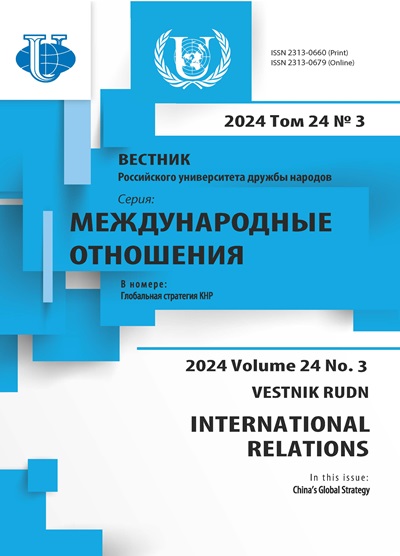Религиозная дипломатия в урегулировании афганского конфликта: возможности и ограничения
- Авторы: Крашенинникова Е.А.1
-
Учреждения:
- МГИМО МИД России
- Выпуск: Том 19, № 4 (2019): Исламский фактор в мировой политике
- Страницы: 533-544
- Раздел: ТЕМАТИЧЕСКОЕ ДОСЬЕ
- URL: https://journals.rudn.ru/international-relations/article/view/22834
- DOI: https://doi.org/10.22363/2313-0660-2019-19-4-533-544
Цитировать
Полный текст
Аннотация
В статье анализируется потенциал религиозной дипломатии в урегулировании афганского конфликта. В российском и зарубежном исследовательском дискурсах освещаются значимость и примеры использования религиозных каналов в качестве инструмента по снижению напряженности и урегулированию конфликтов. Однако акцент делается преимущественно на западной практике работы специализированных институтов (преимущественно христианских) по предотвращению эскалации существующих конфликтов. Настоящая статья, в свою очередь, ориентирована на анализ ранее подробно не изученных в литературе примеров внешнеполитических инициатив исламских религиозных деятелей в современном Афганистане. Рассматриваются актуальные примеры деятельности афганских богословов в национальном и международном форматах по мобилизации международного осуждения силовых методов борьбы движения «Талибан» (ДТ) (запрещено в РФ) против правительства Исламской Республики Афганистан (ИРА). На основе анализа аналитических докладов и публикаций в средствах массовой информации делается вывод о том, что цели правительства в Кабуле по привлечению поддержки со стороны мусульманского мира с помощью использования влияния афганских религиозных кругов были достигнуты лишь частично, так как не удалось добиться единогласного осуждения деятельности ДТ. Религиозная дипломатия официального афганского духовенства вынуждена конкурировать с религиозными деятелями ДТ, которые поддерживают самостоятельные контакты с исламскими общинами других стран. Однако при оценке перспектив дальнейшего использования религиозных каналов для снижения недоверия и международной напряженности делается вывод о востребованности данного инструмента в налаживании конструктивного диалога с обществами стран исламского мира, преодолении кризиса доверия и подготовке благоприятной среды для будущего политического диалога. Автор утверждает, что использование миротворческого потенциала ислама в урегулировании афганского конфликта имеет как возможности, так и ограничения в силу сложившейся международно-политической ситуации вокруг Афганистана.
Об авторах
Елена Андреевна Крашенинникова
МГИМО МИД России
Автор, ответственный за переписку.
Email: eakrasheninnikova@gmail.com
аспирант кафедры мировых политических процессов
Москва, Российская ФедерацияСписок литературы
- Бахриев Б.Х. Публичная дипломатия в урегулировании конфликтов: возможности для Центральной Азии // Известия Саратовского университета. Новая серия. Серия Социология. Политология. 2018. Т. 18. № 2. С. 189-194. doi: 10.18500/1818-9601-2018-18-2-189-194
- Генюш С.В. Экспертная дипломатия: гражданское общество на службе внешней политики // Контуры глобальных трансформаций: политика, экономика, право. 2012. № 5 (25). С. 14-25.
- Дьяконова М.А. Конфессиональный фактор во внешней политике государства (на примере Афганистана) // Вестник Нижегородского университета им Н.И. Лобачевского. 2013. № 6 (1). С. 364-368.
- Искандаров К. Фактор Пакистана в афганском конфликте // Центральная Азия и Кавказ. 2013. Т. 16. № 3. С. 96-111.
- Корнійчук Ю.Ю. Релігійна дипломатія: передумови становлення й теоретичні засади розвитку // Науковий часопис НПУ імені М. П. Драгоманова. Серія 7: Релігієзнавство. Культурологія. Філософія. 2016. Вип. 36 (49). С. 20-27.
- Крашенинникова Е. А. Афганистан: политика bitarafi уже не актуальна? // Азия и Африка сегодня. 2019. № 1. С. 58-63. doi: 10.31857/S032150750003345-1
- Леви Д.А. «Дипломатия веры» как традиционный и новейший метод дипломатии // Scientific Vector of the Balkans. 2017. № 1. С. 31-34.
- Никитина Ю.А. Публичная дипломатия в работе межправительственных организаций: ОДКБ и ШОС // Публичная дипломатия: Теория и практика / под ред. М.М. Лебедевой. М.: Аспект Пресс, 2017. С. 112-127.
- Рашид А. Талибан. Ислам, нефть и новая Большая игра в Центральной Азии. М.: Библион - Русская книга, 2003.
- Сикоев Р.Р. Мусульманское духовенство в общественно-политической жизни Афганистана // Центральная Азия и Кавказ. 2006. № 2 (44). С. 147-153.
- Сикоев Р.Р. Талибы: религиозно-политический портрет. М.: Институт востоковедения РАН, Издательство «Крафт+», 2004.
- Borchgrevink K. Religious Actors and Civil Society in post-2001 Afghanistan. International Peace Research Institute, Oslo (PRIO). November 2007. URL: https://www.prio.org/utility/DownloadFile.ashx?id=425&type=publicationfile (accessed: 30.04.2019).
- Curanovic A. The Religious Diplomacy of the Russian Federation. IFRI Russia - NIS Center. 2012. URL: https://www.ifri.org/ sites/default/files/atoms/files/ifrirnr12curanovicreligiousdiplomacyjune2012.pdf (accessed: 23.03.2019).
- Green N. Afghanistan’s Islam: from Conversion to the Taliban. Oakland: University of California Press, 2017.
- Hussain Z. Sources of Tension in Afghanistan and Pakistan: A Regional Perspective. CIDOB Policy Research Project. December 2011.URL: http://www.observatori.org/paises/pais_87/documentos/ZAHID_HUSSAIN[1].pdf (accessed: 23.03.2019).
- Jodok T. Faith-Based Diplomacy under Examination // The Hague Journal of Diplomacy. 2008. No. 3. P. 209-231.
- Kazemi Reza S. The Challenge of Effectiveness: ‘Pro-Peace’ Ulama in Afghanistan // Afghanistan Analysts Network. July 2012. URL: https://www.afghanistan-analysts.org/the-challenge-of-effectiveness-pro-peace-ulama-in-afghanistan/ (accessed: 23.07.2019).
- Lacroix S. Islamism and the Question of Religious Authority. Danish Institute for International Studies (DIIS). June 2012. URL: https://tuxdoc.com/download/543iteratu-and-the-question-of-religious-authority_pdf (accessed: 23.03.2019).
- Lipovsky I. The Awakening of Central Asian Islam // Middle Eastern Studies. 1996. Vol. 32. No. 3. P. 1-21.
- Malaiz D. The Political Landscape of Afghanistan and the Presidential Election of 2014. CIDOB Policy Research Project. February 2014. URL: https://www.cidob.org/en/publications/publication_series/stap_rp/policy_research_papers/the_ political_landscape_of_afghanistan_and_the_presidential_election_of_2014 (accessed: 23.03.2019).
- Mapendere J. Track One and a Half Diplomacy and the Complementarity of Tracks // Culture of Peace Online Journal. 2005. Vol. 2. No. 1. P. 66-81. URL: https://peacemaker.un.org/sites/peacemaker.un.org/files/TrackOneandaHalf Diplomacy_Mapendere.pdf (accessed: 12.04.2019).
- McDonald John W. Multi-Track Diplomacy // Beyond Intractability. Ed. by G. Burgess, H. Burgess. Conflict Research Consortium, University of Colorado, Boulder, Colorado. September 2003. URL: https://www.beyondintractability.org/essay/ multi-track-diplomacy (accessed: 23.03.2019).
- Mufti M., Lamb R. Religion and Militancy in Pakistan and Afghanistan. A Literature Review. Report of the CSIS Program on Crisis, Conflict and Cooperation. June 2012. URL: https://csis-prod.s3.amazonaws.com/s3fs-public/legacy_files/ files/publication/120709_Mufti_ReligionMilitancy_Web.pdf (accessed: 23.03.2019).
- Religion and Public Diplomacy / Ed. by P. Seib. NY: Palgrave Macmillan, 2013.











